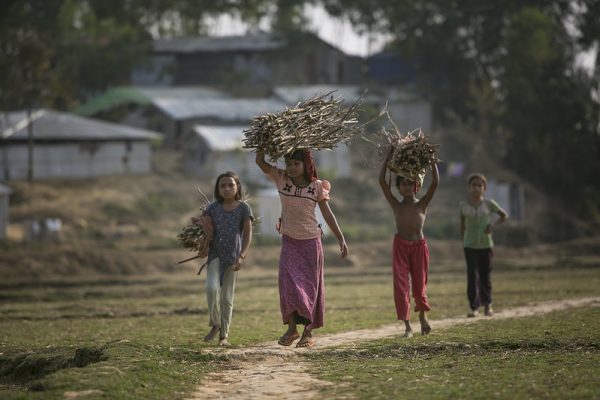Myanmars Shadow Government Promises Justice for Rohingya Atrocities
 Advertisement
AdvertisementMyanmar’s opposition National Unity Government (NUG) has promised that it will “seek justice and accountability†for the horrific crimes committed against the country’s minority Rohingya population. In a statement published on Tuesday, the NUG, which was formed to oppose the military junta that seized power in February, said that it was “deeply saddened by the horrendous violence, gross human rights violations, and massive displacement†that had been suffered by the Rohingya.
“We will endeavor to seek justice and accountability for all crimes committed by the military against the Rohingya and all other people of Myanmar across the country throughout our history,†the NUG said in its statement. “It is important to bring perpetrators to account in the interest of truth and justice, as well as because we believe doing so will act as a deterrent against future atrocities.â€
The statement came a day before the fourth anniversary of the Myanmar military’s brutal clearance operation in northern Rakhine State in Myanmar’s west. Allegedly launched in response to scattered attacks by Rohingya militants, the August 2017 attacks saw Myanmar troops raze villages, shoot civilians, rape girls and women, and drive more than 700,000 people over the border into Bangladesh â€" an offensive that United Nations investigators later said showed “genocidal intent.â€
Meanwhile, most of the Rohingya that remain in Rakhine languish in a series of fenced-in ghettos and camps for displaced people that rights groups have likened to a form of apartheid.
The NUG’s statement, which came amid a flurry of similar calls from various human rights groups and political organizations marking the dark anniversary, said that it was willing to accept the jurisdiction of the International Criminal Court (ICC) for crimes dating back to 2002.
Myanmar is not a party to the Rome Statute that formed the ICC, so the court does not currently have jurisdiction over crimes committed on Myanmar’s territory, meaning that any investigation by the court would focus solely on acts committed inside Bangladesh, which is a party to the statute. The NUG’s decision, should it ever be in a position to implement it, would empower the ICC to investigate crimes committed by the military in Rakhine State and other parts of Myanmar.
The NUG promise followed a similar pledge that it would grant the country’s Rohingya minority population citizenship, inviting the beleaguered minority “to join hands with us and with others to participate in this Spring Revolution against the military dictatorship in all possible ways.†It also promised to repeal Myanmar’s problematic 1982 Citizenship Law, which has complicated the ability of many Rohingya to gain citizenship â€" a promise that it repeated in Tuesday’s statement.
Diplomat BriefWeekly NewsletterNGet briefed on the story of the week, and developing stories to watch across the Asia-Pacific.
Get the NewsletterThe NUG’s promises undoubtedly mark an important step, one that rights advocates believe is necessary for the creation of a peaceful and inclusive Myanmar. As Khin Ohmar and Thinzar Shunlei Yi wrote recently in Myanmar Now, “the NUG must now face the lack of justice and accountability that have allowed the Myanmar military to commit grave crimes against ethnic communities, including the Rohingya, for decades.â€
AdvertisementThe NUG’s promise is also politically significant given the fact that its cabinet includes a number of former ministers from the ousted National League for Democracy (NLD) government, including former State Counselor Aung San Suu Kyi, who were in power at the time of â€" and arguably complicit in â€" the assaults against the Rohingya.
While the NLD’s defenders rightly argue that the government had no effective control over the army’s actions â€" the military-drafted 2008 Constitution gives it autonomy from civilian control â€" it nonetheless defended its actions. The NLD government described claims of the rape of Rohingya women as “fake†and asserted that the Rohingya were illegal immigrants from Bangladesh. On one occasion Suu Kyi blamed “terrorists†for “a huge iceberg of misinformation†around the situation in Rakhine State.
Since the NUG’s formation in April, this has threatened to undermine its attempts to gain recognition as Myanmar’s legitimate government. For this reason, as I noted of the earlier promise, “the NUG’s clarification is clearly geared toward assuaging foreign doubts about its democratic credentials, and gaining support and formal diplomatic recognition.†Matthew Smith of the advocacy group Fortify Rights hailed the NUG’s promise, and described it as a “180-degree turn†from the position of the previous government.
However important the NUG’s promise is â€" and it marks a step in the direction of a more inclusive future for multiethnic Myanmar â€" the bigger question is whether the party will ever be in a position to implement it.
This week, Frontier Myanmar reported on the growing frustration with the NUG’s “lack of progress in establishing itself as a genuine rival administration to the military regime, let alone removing the Tatmadaw from power.†The article described the frustrations, felt by some young activists, that the NUG’s leadership is more interested in releasing uplifting statements than actually gaining power.
Admittedly, this is no mean feat, considering that the military junta retains control of Myanmar’s airspace and the country’s central regions, despite the increasing instances of armed resistance to it, while the NUG controls no territory of its own. Nonetheless, “If history is a guide, the parallel government faces a growing risk of sliding into irrelevance as time passes.†Or as Aye Min Thant, Frontier’s features editor, posted on Twitter earlier this week, “Legitimacy and recognition is not power. Power is power. We cannot win the game of thrones until people understand this.â€

0 Response to "Myanmars Shadow Government Promises Justice for Rohingya Atrocities"
Post a Comment